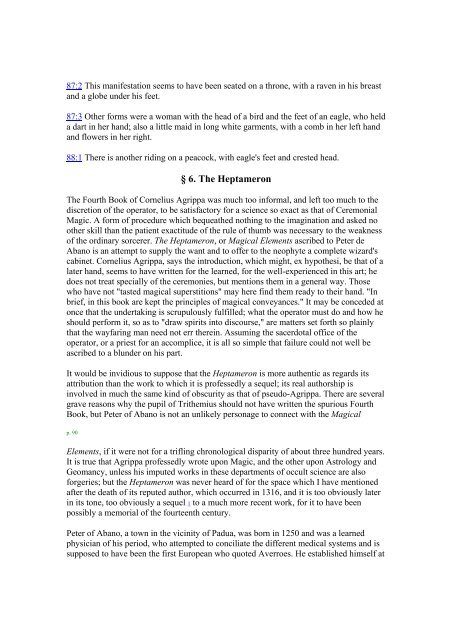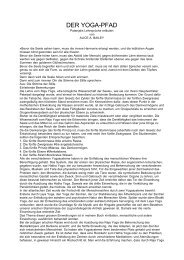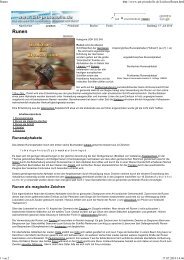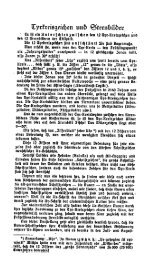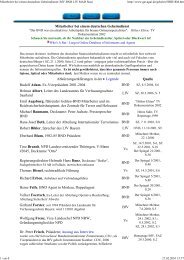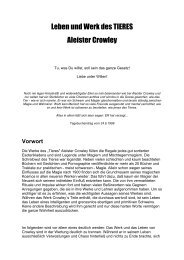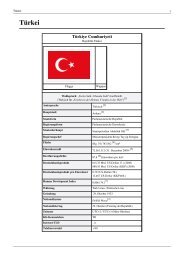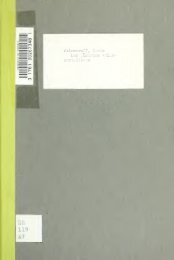The Book of ceremonial Magic
The Book of ceremonial Magic
The Book of ceremonial Magic
Create successful ePaper yourself
Turn your PDF publications into a flip-book with our unique Google optimized e-Paper software.
87:2 This manifestation seems to have been seated on a throne, with a raven in his breast<br />
and a globe under his feet.<br />
87:3 Other forms were a woman with the head <strong>of</strong> a bird and the feet <strong>of</strong> an eagle, who held<br />
a dart in her hand; also a little maid in long white garments, with a comb in her left hand<br />
and flowers in her right.<br />
88:1 <strong>The</strong>re is another riding on a peacock, with eagle's feet and crested head.<br />
§ 6. <strong>The</strong> Heptameron<br />
<strong>The</strong> Fourth <strong>Book</strong> <strong>of</strong> Cornelius Agrippa was much too informal, and left too much to the<br />
discretion <strong>of</strong> the operator, to be satisfactory for a science so exact as that <strong>of</strong> Ceremonial<br />
<strong>Magic</strong>. A form <strong>of</strong> procedure which bequeathed nothing to the imagination and asked no<br />
other skill than the patient exactitude <strong>of</strong> the rule <strong>of</strong> thumb was necessary to the weakness<br />
<strong>of</strong> the ordinary sorcerer. <strong>The</strong> Heptameron, or <strong>Magic</strong>al Elements ascribed to Peter de<br />
Abano is an attempt to supply the want and to <strong>of</strong>fer to the neophyte a complete wizard's<br />
cabinet. Cornelius Agrippa, says the introduction, which might, ex hypothesi, be that <strong>of</strong> a<br />
later hand, seems to have written for the learned, for the well-experienced in this art; he<br />
does not treat specially <strong>of</strong> the ceremonies, but mentions them in a general way. Those<br />
who have not "tasted magical superstitions" may here find them ready to their hand. "In<br />
brief, in this book are kept the principles <strong>of</strong> magical conveyances." It may be conceded at<br />
once that the undertaking is scrupulously fulfilled; what the operator must do and how he<br />
should perform it, so as to "draw spirits into discourse," are matters set forth so plainly<br />
that the wayfaring man need not err therein. Assuming the sacerdotal <strong>of</strong>fice <strong>of</strong> the<br />
operator, or a priest for an accomplice, it is all so simple that failure could not well be<br />
ascribed to a blunder on his part.<br />
It would be invidious to suppose that the Heptameron is more authentic as regards its<br />
attribution than the work to which it is pr<strong>of</strong>essedly a sequel; its real authorship is<br />
involved in much the same kind <strong>of</strong> obscurity as that <strong>of</strong> pseudo-Agrippa. <strong>The</strong>re are several<br />
grave reasons why the pupil <strong>of</strong> Trithemius should not have written the spurious Fourth<br />
<strong>Book</strong>, but Peter <strong>of</strong> Abano is not an unlikely personage to connect with the <strong>Magic</strong>al<br />
p. 90<br />
Elements, if it were not for a trifling chronological disparity <strong>of</strong> about three hundred years.<br />
It is true that Agrippa pr<strong>of</strong>essedly wrote upon <strong>Magic</strong>, and the other upon Astrology and<br />
Geomancy, unless his imputed works in these departments <strong>of</strong> occult science are also<br />
forgeries; but the Heptameron was never heard <strong>of</strong> for the space which I have mentioned<br />
after the death <strong>of</strong> its reputed author, which occurred in 1316, and it is too obviously later<br />
in its tone, too obviously a sequel 1 to a much more recent work, for it to have been<br />
possibly a memorial <strong>of</strong> the fourteenth century.<br />
Peter <strong>of</strong> Abano, a town in the vicinity <strong>of</strong> Padua, was born in 1250 and was a learned<br />
physician <strong>of</strong> his period, who attempted to conciliate the different medical systems and is<br />
supposed to have been the first European who quoted Averroes. He established himself at


